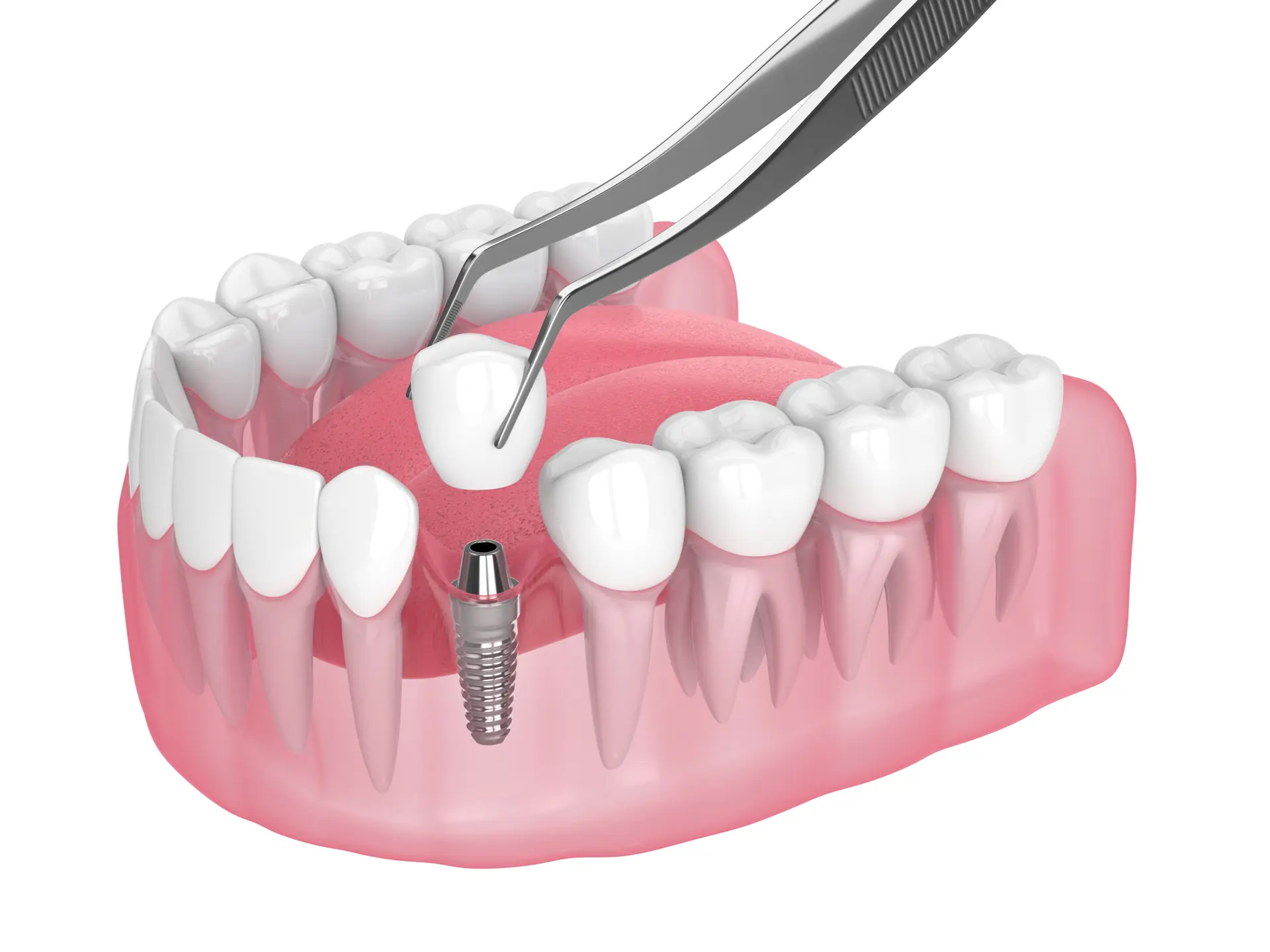Picture a dental implant process that’s faster, smoother, and more precise than ever before. That’s exactly what artificial intelligence (AI) is bringing to the table in modern dentistry. Forget the days of long waits, guesswork, and discomfort—AI is reshaping the entire experience, from planning to placement, with remarkable accuracy and efficiency.
Advanced imaging, predictive algorithms, and cutting-edge software are working together to create implants tailored perfectly to each patient’s needs. The result? A process that’s not only more reliable but also far less stressful.
Whether it’s simplifying diagnostics or fine-tuning surgical procedures, AI is making dental implants smarter, safer, and surprisingly seamless. This technology isn’t just changing teeth—it’s changing lives, one confident smile at a time. Ready to explore how this revolution is transforming dentistry? Let’s dive in!
How Is Artificial Intelligence Improving The Accuracy of Dental Implant Procedures?
One of the most critical aspects of successful dental implant surgery is precision. The placement of the implant requires careful planning and execution to ensure proper alignment, integration with the jawbone, and optimal aesthetics. AI is playing a significant role in improving the accuracy of these procedures, ensuring that implants are placed with unparalleled precision.
AI-Assisted Imaging and 3D Mapping
Traditional dental X-rays and CT scans provide valuable insights into the patient’s jaw structure, but AI has taken these images to the next level by enabling 3D mapping and more advanced imaging techniques. AI algorithms can process these images and create highly detailed, three-dimensional representations of the patient’s anatomy, which guides the surgical process with extraordinary accuracy.
- Detailed anatomical mapping: AI analyzes CT scans and X-rays to generate 3D models of the patient’s mouth, highlighting key anatomical features such as bone density, nerve locations, and the overall structure of the jaw. This enhanced visual representation allows for a more precise approach to implant placement.
- Predictive modeling: AI can predict how the implant will integrate with the bone and adjust the placement accordingly, ensuring optimal positioning that minimizes complications and enhances the long-term success of the implant.
- Virtual surgery planning: AI allows dental professionals to plan the surgery in a virtual environment before any incisions are made. By simulating the procedure, AI helps reduce human error and improves the overall efficiency of the treatment.
Real-time Guidance During Surgery
AI-powered technologies such as robotic systems and augmented reality (AR) tools are increasingly being used to provide real-time guidance during implant surgery. These systems offer enhanced precision and can help the dental professional navigate the surgical site with accuracy, ensuring the implant is placed in the ideal position.
- Robotic systems: AI-assisted robotic devices can guide dental surgeons through the precise drilling and placement of implants, minimizing human error and improving outcomes.
- Augmented reality (AR): AR technology, powered by AI, allows for real-time visualization of the surgical site, providing additional information and enhancing the dentist’s ability to perform complex procedures with greater precision.
What Role Does AI Play in Customizing Dental Implant Solutions?
One of the most exciting aspects of AI in dental implantology is its ability to customize implant solutions for each patient. Every patient’s mouth is unique, and traditional, one-size-fits-all approaches to implants don’t always provide the best results. AI is helping to create personalized implant solutions that take into account each individual’s anatomy, lifestyle, and needs.
Personalized Implant Design
AI can be used to create custom implants tailored to the shape and size of a patient’s mouth, as well as their specific bone structure. This ensures that the implant fits perfectly and integrates seamlessly with the surrounding tissue, leading to better functionality and aesthetics.
- 3D-printed implants: AI assists in designing implants that are 3D-printed to match the exact specifications of the patient’s mouth. These custom-made implants are not only more comfortable but also have a higher success rate because they are designed to work with the patient’s unique jaw structure.
- Bone regeneration simulation: AI tools can simulate how bone will regenerate around the implant, predicting how the implant will perform over time and making adjustments to the design if necessary.
Treatment Plan Customization
AI can assist in creating a treatment plan that is tailored to the individual patient, factoring in their medical history, preferences, and desired outcomes. By analyzing data from previous cases and clinical studies, AI can suggest the most appropriate course of action and help the dental professional determine the best implant material, size, and placement location.
- Personalized recommendations: AI can analyze data from various sources, including the patient’s medical records, imaging scans, and even social or lifestyle factors like diet and oral hygiene, to generate personalized treatment recommendations.
- Optimizing treatment times: AI systems help determine the most efficient and effective approach to the procedure, reducing unnecessary steps and making the process smoother for both the dentist and the patient.
How Does AI Enhance the Patient Experience During Dental Implant Treatments?
A dental implant procedure, while highly effective, can be an intimidating and time-consuming process for patients. AI is playing a vital role in improving the overall patient experience by reducing discomfort, shortening recovery times, and making the procedure more predictable.
Minimally Invasive Techniques
AI is enhancing the precision of dental implant placement, allowing for more minimally invasive procedures. By using advanced imaging and predictive tools, dental professionals can minimize the need for large incisions, reduce swelling, and promote faster healing.
- Smaller incisions: AI-driven planning ensures that only the necessary areas are targeted during surgery, reducing the trauma to surrounding tissues and speeding up recovery times.
- Faster recovery: With AI’s ability to predict the optimal placement of implants and reduce surgical complications, patients experience less pain, shorter recovery times, and fewer follow-up visits.
Enhanced Communication and Education
AI is improving how patients understand the implant process. Virtual consultations, interactive 3D models, and AI-powered educational tools help patients visualize what the procedure will involve, what to expect during recovery, and how the final results will look.
- Virtual consultations: AI-powered virtual tools allow patients to interact with their dentist before even stepping into the office. Virtual consultations provide a chance for patients to ask questions, share their concerns, and receive detailed explanations about the procedure.
- Visualization tools: AI-driven visualization tools enable patients to see 3D models of their new smile before the procedure begins, helping them feel more confident about the treatment plan.
Improved Post-Operative Care
AI doesn’t just play a role in the pre-surgery or surgery phases—it also enhances post-operative care. With AI-enabled monitoring systems, patients can receive real-time feedback on their recovery and even track their healing progress.
- Post-operative monitoring: AI systems can track patients’ recovery through digital platforms, offering reminders for follow-up care, medication management, and tracking of healing progress.
- Telemedicine support: AI-powered telemedicine platforms enable patients to communicate with their dental professional remotely, asking questions and receiving guidance throughout the healing process.
What are the Latest Advancements in AI Technology For Dental Implantology?
AI technology continues to evolve rapidly, and the field of dental implantology is seeing some of the most cutting-edge advancements. These new technologies are further transforming how implants are designed, placed, and monitored, making the entire process more efficient and effective.
AI-Driven Diagnostic Tools
One of the most recent advancements in AI for dental implantology is the development of AI-powered diagnostic tools that help dental professionals assess the health of a patient’s jawbone and identify any potential issues before surgery begins. These tools use advanced algorithms to analyze CT scans, X-rays, and other imaging data to detect abnormalities or weaknesses in the bone structure that might not be visible to the human eye.
- Bone density analysis: AI can analyze bone density and suggest the ideal type of implant material based on the patient’s jawbone condition, ensuring a better fit and stronger integration.
- Early detection of issues: AI algorithms can detect signs of bone disease, infections, or other conditions that may affect the success of the implant, allowing for early intervention and better outcomes.
AI-Powered Robotic Surgery Systems
One of the most exciting developments in dental implantology is the use of AI-assisted robotic systems. These systems use AI to guide the dentist through the implant procedure, offering real-time feedback, precision control, and the ability to make minute adjustments during surgery.
- Precision placement: AI-powered robotic systems can help ensure that the implant is placed at the correct angle, depth, and location, significantly improving the accuracy of the procedure.
- Real-time adjustments: These systems can make real-time adjustments during surgery to ensure that the implant is perfectly placed, reducing human error and improving outcomes.
Machine Learning for Predictive Outcomes
Machine learning algorithms are now being used to analyze vast amounts of data from previous implant surgeries, patient demographics, and recovery rates. This allows for the development of predictive models that can help dental professionals make more informed decisions about implant placement and post-operative care.
- Predicting success rates: AI models can predict the likelihood of success for a particular implant based on factors such as bone health, the patient’s age, and their oral hygiene habits.
- Improved planning: AI helps to identify the most suitable implant design and procedure plan based on historical data and the patient’s individual profile.
In conclusion, artificial intelligence is fundamentally transforming the dental implant experience, making it more accurate, efficient, and personalized. From enhanced precision in implant placement to improved patient care and post-operative monitoring, AI is revolutionizing every aspect of dental implantology. With continued advancements in AI technology, the future of dental implants looks incredibly promising, offering even better outcomes and a smoother experience for patients. Whether you’re considering implants or have already undergone the procedure, AI’s role in improving the process is helping to create lasting, beautiful smiles with unparalleled precision and care.
Transform Your Smile with Cutting-Edge Technology
At River District Dentistry Smiles, we are excited to offer the latest advancements in dental implantology, including AI-driven precision and personalized care to help you achieve the smile you deserve. Our team of experienced professionals is dedicated to providing top-tier care and the most advanced treatment options for our patients.
If you’re considering dental implants, now is the perfect time to take the next step toward a healthier, more confident smile. Contact us today to schedule your consultation and experience how AI technology can enhance your dental implant journey!


